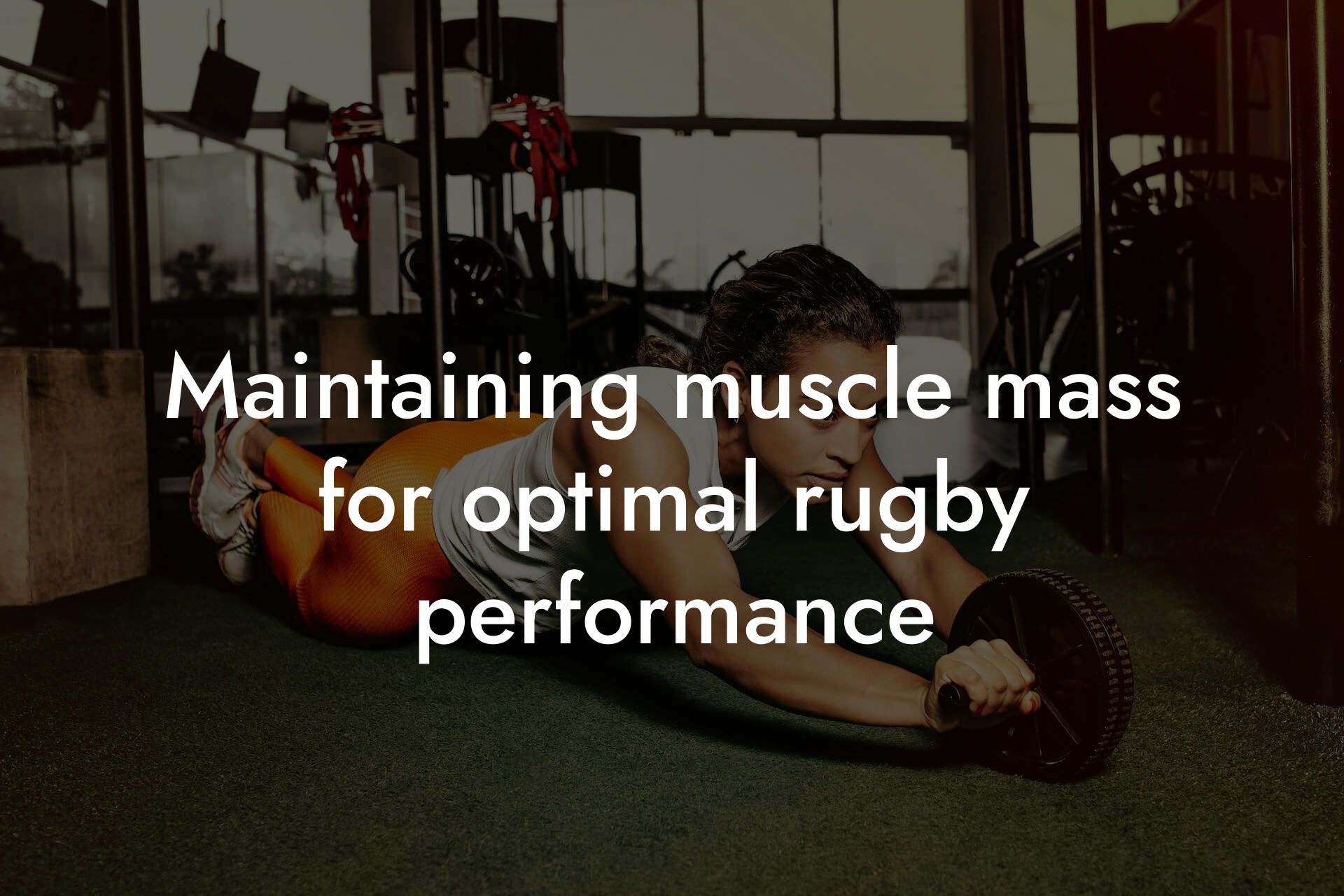Why Body Fat Matters in Rugby
As a rugby player, you understand the importance of being in top physical condition to perform at your best on the field. One crucial aspect of achieving optimal performance is maintaining a healthy body fat percentage. Excess body fat can hinder your agility, speed, and overall power, making it more challenging to evade tackles, accelerate quickly, and sustain long periods of intense physical activity. In this article, we'll delve into the importance of reducing body fat for better agility and power in rugby, and provide you with actionable tips and strategies to achieve your goals.
Table of Contents
- Why Body Fat Matters in Rugby
- The Ideal Body Fat Percentage for Rugby Players
- How to Assess Your Body Fat Percentage
- The Impact of Excess Body Fat on Rugby Performance
- Nutrition Strategies for Reducing Body Fat
- Training Strategies for Reducing Body Fat
- Additional Tips for Reducing Body Fat
- Frequently Asked Questions
The Ideal Body Fat Percentage for Rugby Players
Research suggests that the ideal body fat percentage for male rugby players ranges from 10-15% for backs and 15-20% for forwards. For female rugby players, the ideal range is 15-20% for backs and 20-25% for forwards. However, it's essential to note that these are general guidelines, and the optimal body fat percentage can vary depending on individual factors such as position, playing style, and personal goals.
How to Assess Your Body Fat Percentage
Accurately assessing your body fat percentage is crucial to understanding your current state and tracking progress over time. At Tano Performance Group, we use Dual-Energy X-ray Absorptiometry (DEXA) scans to provide a comprehensive body assessment. DEXA scans offer a precise measurement of body fat percentage, lean mass, and bone density, giving you a detailed understanding of your body composition. This information enables you to create a tailored training and nutrition plan to achieve your goals.
The Impact of Excess Body Fat on Rugby Performance
Carrying excess body fat can have a significant impact on your rugby performance. Here are some of the ways excess body fat can hinder your game:
- Reduced speed and agility: Excess body fat increases your overall weight, making it more challenging to accelerate quickly and change direction rapidly.
- Decreased power: Excess body fat reduces your power-to-weight ratio, making it more difficult to generate force and speed.
- Impaired endurance: Carrying excess body fat increases your energy expenditure, leading to fatigue and decreased endurance.
- Increased risk of injury: Excess body fat can put additional stress on your joints, increasing the risk of injury and reducing your overall durability.
Nutrition Strategies for Reducing Body Fat
A well-structured nutrition plan is essential for reducing body fat and improving rugby performance. Here are some evidence-based nutrition strategies to help you achieve your goals:
- Create a calorie deficit: Reduce your daily caloric intake to create a calorie deficit, which will help your body burn stored fat for energy.
- Increase protein intake: Aim for 1.6-2.2 grams of protein per kilogram of body weight to support muscle growth and repair.
- Focus on whole foods: Prioritize whole, unprocessed foods such as lean meats, fish, fruits, vegetables, and whole grains.
- Hydrate adequately: Drink plenty of water to help with appetite control and overall health.
Training Strategies for Reducing Body Fat
A well-structured training program is crucial for reducing body fat and improving rugby performance. Here are some evidence-based training strategies to help you achieve your goals:
- High-Intensity Interval Training (HIIT): Incorporate HIIT sessions to improve cardiovascular fitness, increase caloric expenditure, and enhance fat loss.
- Resistance Training: Focus on resistance exercises such as squats, deadlifts, and bench press to build lean muscle mass and increase metabolism.
- Plyometric Training: Incorporate plyometric exercises such as jump squats and box jumps to improve power and explosiveness.
- Active Recovery: Incorporate low-intensity aerobic exercises such as cycling or swimming to aid in recovery and enhance fat loss.
Additional Tips for Reducing Body Fat
In addition to a well-structured nutrition and training plan, here are some additional tips to help you reduce body fat and improve rugby performance:
- Get enough sleep: Aim for 7-9 hours of sleep per night to aid in recovery and fat loss.
- Manage stress: Engage in stress-reducing activities such as yoga or meditation to help regulate cortisol levels and promote fat loss.
- Monitor progress: Regularly track your body fat percentage, weight, and performance metrics to monitor progress and make adjustments as needed.
Reducing body fat is a critical component of achieving optimal performance in rugby. By understanding the importance of body fat, assessing your current state, and implementing evidence-based nutrition and training strategies, you can improve your agility, power, and overall performance on the field. Remember to stay patient, consistent, and committed to your goals, and don't hesitate to seek professional guidance from a qualified coach or nutritionist. At Tano Performance Group, we're dedicated to helping high-earning professionals like you achieve their physical goals and take their performance to the next level.
Frequently Asked Questions
What is the ideal body fat percentage for rugby players?
For rugby players, the ideal body fat percentage varies depending on the position played. Generally, a body fat percentage between 10-15% is considered optimal for forwards, while 8-12% is ideal for backs. However, this can vary depending on individual factors such as muscle mass, bone density, and overall fitness level.
How does excess body fat affect agility and power in rugby?
Excess body fat can significantly impair agility and power in rugby players. Carrying extra weight can reduce speed, acceleration, and deceleration, making it more difficult to change direction quickly or explosively. Additionally, excess body fat can increase the risk of injury, particularly in the joints and muscles.
What are the benefits of reducing body fat for rugby players?
Reducing body fat can have numerous benefits for rugby players, including improved agility, power, speed, and endurance. It can also enhance overall athletic performance, reduce the risk of injury, and improve mental focus and confidence.
How can I measure my body fat percentage?
There are several ways to measure body fat percentage, including skinfold measurements, bioelectrical impedance analysis (BIA), and dual-energy X-ray absorptiometry (DXA). It's essential to consult with a qualified healthcare professional or certified fitness expert to determine the most accurate and suitable method for you.
What is the best way to reduce body fat for rugby players?
A combination of proper nutrition, regular exercise, and sufficient rest and recovery is the most effective way to reduce body fat for rugby players. Focus on consuming a balanced diet with plenty of protein, healthy fats, and complex carbohydrates, and engage in a structured training program that includes strength training, conditioning, and high-intensity interval training (HIIT).
How important is nutrition in reducing body fat for rugby players?
Nutrition plays a critical role in reducing body fat for rugby players. A well-structured diet that provides adequate protein, healthy fats, and complex carbohydrates can help support weight loss, improve body composition, and enhance overall athletic performance. Aim to consume a balanced diet with plenty of whole foods, fruits, vegetables, lean proteins, and healthy fats.
What are some effective exercises for reducing body fat in rugby players?
Effective exercises for reducing body fat in rugby players include strength training exercises such as squats, deadlifts, and bench press, as well as conditioning exercises like sprints, hill sprints, and pro agility shuttles. HIIT workouts that combine strength and conditioning exercises can also be highly effective.
How often should I exercise to reduce body fat for rugby?
Aim to exercise at least 3-4 times per week, with a combination of strength training, conditioning, and HIIT workouts. It's essential to allow for adequate rest and recovery time to avoid injury and promote optimal fat loss.
Can I reduce body fat through cardio exercises alone?
While cardio exercises can help with weight loss, they may not be as effective for reducing body fat in rugby players. A combination of strength training, conditioning, and HIIT workouts can help improve body composition and enhance overall athletic performance.
How can I stay motivated to reduce body fat for rugby?
Staying motivated to reduce body fat for rugby requires setting specific, measurable, and achievable goals. Break down your goals into smaller, manageable steps, and track your progress regularly. Celebrate your successes and don't be too hard on yourself when you encounter setbacks.
What are some common mistakes rugby players make when trying to reduce body fat?
Common mistakes rugby players make when trying to reduce body fat include crash dieting, overtraining, and neglecting proper nutrition. Avoid fad diets, focus on sustainable lifestyle changes, and prioritize proper nutrition and recovery to support optimal fat loss.
How long does it take to see results from reducing body fat for rugby?
The time it takes to see results from reducing body fat for rugby varies depending on individual factors such as starting body fat percentage, training program, and nutrition plan. Aim to make sustainable lifestyle changes and track your progress regularly to see noticeable improvements in 6-12 weeks.
Can I reduce body fat too quickly for rugby?
Yes, reducing body fat too quickly can be detrimental to rugby performance. Aim for a slow and steady weight loss of 0.5-1 kg per week to ensure you're losing fat and not muscle mass.
How can I maintain my muscle mass while reducing body fat for rugby?
To maintain muscle mass while reducing body fat for rugby, focus on consuming adequate protein (1.6-2.2 grams per kilogram of body weight), engaging in regular strength training exercises, and getting sufficient rest and recovery.
What role does sleep play in reducing body fat for rugby?
Sleep plays a critical role in reducing body fat for rugby. Aim for 7-9 hours of sleep per night to help regulate hormones, support muscle recovery, and enhance overall athletic performance.
How can I reduce body fat while still consuming my favorite foods?
To reduce body fat while still consuming your favorite foods, focus on moderation and portion control. Allow yourself the occasional treat, but prioritize whole, nutrient-dense foods and avoid overindulging in high-calorie, high-fat, or high-sugar foods.
Can I reduce body fat for rugby without sacrificing performance?
Yes, it's possible to reduce body fat for rugby without sacrificing performance. Focus on making sustainable lifestyle changes, prioritizing proper nutrition, and engaging in a structured training program that includes strength training, conditioning, and HIIT workouts.
How can I track my progress when reducing body fat for rugby?
To track your progress when reducing body fat for rugby, take regular body fat measurements, track your weight, measurements, and body composition, and monitor your performance in training and games.
What are some common myths about reducing body fat for rugby?
Common myths about reducing body fat for rugby include the idea that low-fat diets are effective, that cardio exercises are the best way to lose fat, and that crash dieting is a quick fix. Avoid these myths and focus on making sustainable lifestyle changes that prioritize proper nutrition, regular exercise, and sufficient rest and recovery.
How can I get support when reducing body fat for rugby?
To get support when reducing body fat for rugby, consider working with a qualified healthcare professional, certified fitness expert, or sports dietitian. They can help you develop a personalized training and nutrition plan tailored to your specific needs and goals.
What are some additional resources for reducing body fat for rugby?
Additional resources for reducing body fat for rugby include online fitness and nutrition programs, sports performance centers, and rugby-specific training camps. Consult with a qualified healthcare professional or certified fitness expert to determine the best resources for your specific needs and goals.
How can I stay accountable when reducing body fat for rugby?
To stay accountable when reducing body fat for rugby, consider working with a training partner or accountability group, tracking your progress regularly, and setting specific, measurable, and achievable goals.
What are some common challenges rugby players face when reducing body fat?
Common challenges rugby players face when reducing body fat include lack of motivation, poor nutrition, inadequate rest and recovery, and unrealistic expectations. Stay focused, prioritize proper nutrition and recovery, and celebrate your successes to overcome these challenges.
Here are some related articles you might love...
- Strength training programs for amateur rugby players
- Using DEXA scans to optimize rugby training
- Maintaining muscle mass for optimal rugby performance
- Nutrition strategies for sustaining energy during rugby matches
- How to optimize endurance and power in rugby
- The role of body composition in rugby performance
- Recovery strategies for rugby athletes after matches
- Off-season conditioning for amateur rugby players
- Bone density and injury prevention in rugby
Zak Faulkner
Zak Faulkner is a leading authority in the realm of physical health and body composition analysis, with over 15 years of experience helping professionals optimise their fitness and well-being. As one the experts behind Tano Performance Group, Zak has dedicated his career to providing in-depth, science-backed insights that empower clients to elevate their physical performance and overall health.
With extensive knowledge of DEXA technology, Zak specializes in delivering comprehensive body assessments that offer precise data on body fat, muscle mass, bone density, and overall physique. His expertise enables individuals to make informed decisions and achieve their fitness goals with accuracy and confidence. Zak’s approach is rooted in a deep understanding of human physiology, combined with a passion for helping clients unlock their full potential through personalised strategies.
Over the years, Zak has earned a reputation for his commitment to excellence, precision, and client-focused service. His guidance is trusted by top professionals who demand the best when it comes to their health. Whether advising on fitness programs, nutritional strategies, or long-term wellness plans, Zak Faulkner’s insights are a valuable resource for anyone serious about taking their health and fitness to the next level.
At Tano Performance Group, Zak continues to lead our Content Team revolutionising how professionals approach their physical health, offering unparalleled expertise that drives real results.




